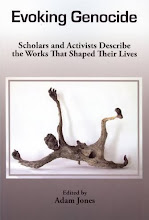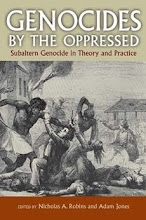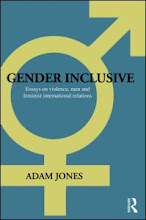 |
| "An image taken from the film trailer for 'The Act of Killing.'" (YouTube screen shot) |
By Sara Schonhardt
The Christian Science Monitor, December 13, 2012
"In a small screening room packed to capacity, young Indonesians sat riveted, their eyes glued to images of a village reenacting the massacre of suspected communists by a paramilitary youth group in the mid-1960s. At moments in the film 'The Act of Killing,' people laughed. At others they cringed. Some clasped their hands over their mouths in reaction to particularly chilling scenes. 'I'm still in shock,' says Handy Pernando, a 23-year-old who emerged from the showing trying to comprehend what he had just seen. 'I knew the government was lying to people, but now I've been awakened.' 'The Act of Killing' recounts the slaughter of up to 2 million people following an attempted coup in 1965. Then-general and later president Suharto blamed the coup on the Communist Party and proceeded to vilify anyone associated with it during his 32-year authoritarian rule. The killings are one of the darkest but least discussed parts of Indonesia's history, and 'The Act of Killing' has gotten praise internationally for its use of campy theatrics and testimony from some of the actual killers to shine new light on this part of the country’s past. In doing so, however, it also implicates many people still in power, as well as a politically connected paramilitary group, the Pancasila Youth. That explains the showings in small venues. Out of fear the film could be banned by the government, which requires all films to be vetted, its producers, director, and local collaborators have been showing it through underground, invite-only screenings rather than submit it to the national censorship board for approval.
Some analysts and academics say it's widely believe that 'The Act of Killing' would be rejected, an indication that the country is still unwilling to address an authoritarian and violent era that is unknown to a large part of the populace, particularly young people. 'I think this is a special skill from the government to create fear,' says Iwan Pirous, a professor of anthropology at the University of Indonesia (UI). 'My fear is that there are too many people in power who were involved in these events. Although we insist on universal human rights, Indonesia still does not want to deal with these issues.' In 2009 the board banned 'Balibo,' another film that sought to address Indonesia’s shadowy past by telling the story of five journalists killed by government forces in East Timor in 1975. In recent weeks, dozens of organizations have screened the film in private. Venues have been so packed that some have agreed to multiple viewings. As demand has grown, people have started publicizing the movie through Facebook and Twitter. There is no requirement that the screenings be secret, since unapproved films can be shown in small venues. But some organizations have decided to go public with bigger showings. On Tuesday, Professor Pirous helped organize a public viewing at UI that was attended by more than 400 students. So far, the showings have been free of protest and violence, but a local newspaper was attacked recently for publishing a story about the documentary. Director Joshua Oppenheimer said fears that screenings could be stopped or even attacked signal that 'Indonesia has not made a complete transition to democracy.' 'The Act of Killing' is the first film to document the events of 1965 through the eyes of the killers. Historians and political scientists have called it unprecedented for allowing the murderers to implicate themselves without shame. In the opening scene, for instance, the main character, Anwar Congo, demonstrates with pride how he killed his victims. Indonesia's official human rights body, Komnas HAM, which released a detailed report in July providing evidence of human rights abuses, issued a statement on the film, saying Indonesians must recognize the 'terror and repression' on which the country was built to ensure its reputation as a vibrant democracy. The attorney general’s office, however, has rejected its request to conduct an official investigation into those alleged crimes. [...]"














No comments:
Post a Comment
Please be constructive in your comments. - AJ